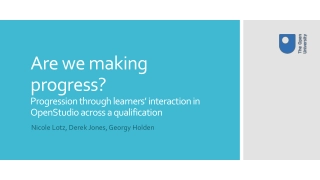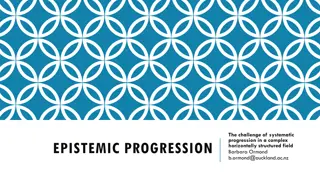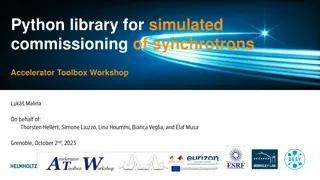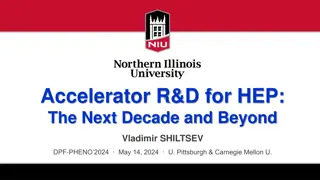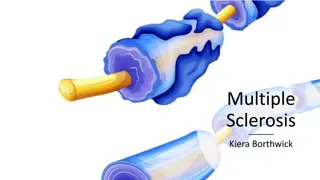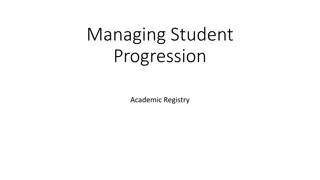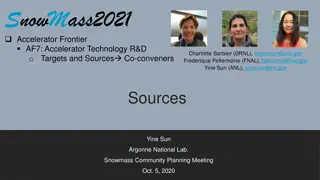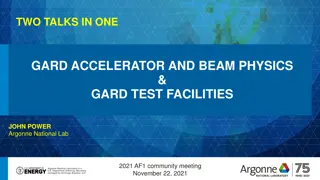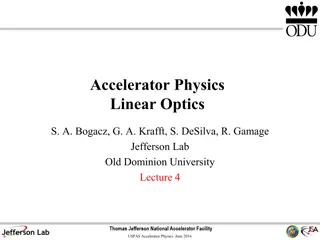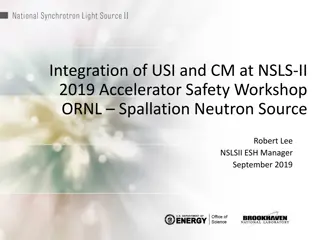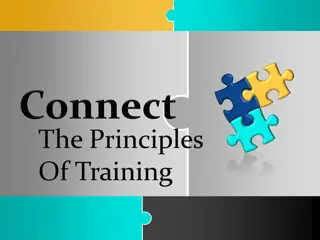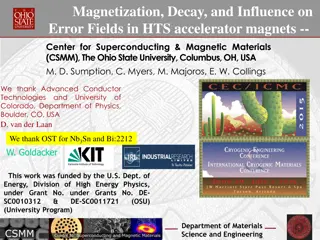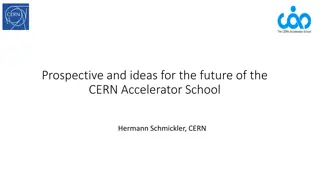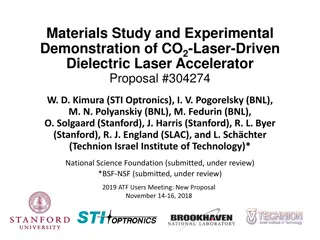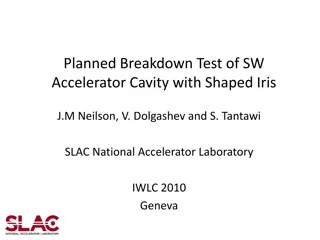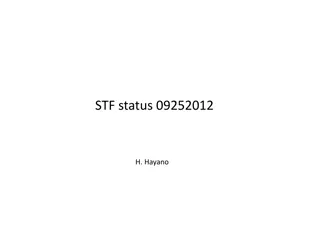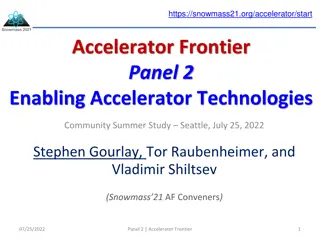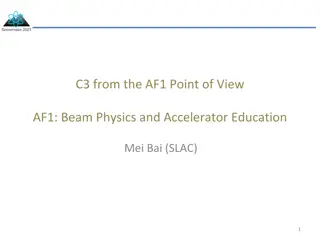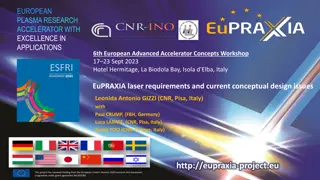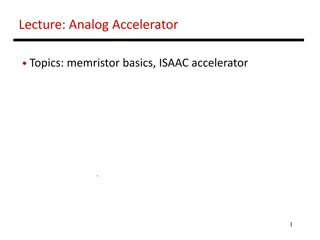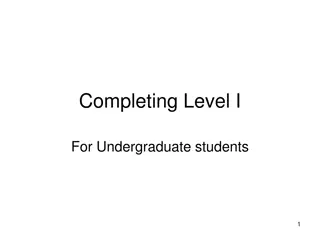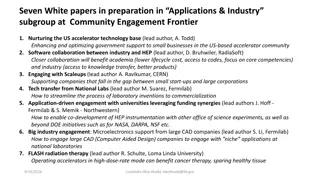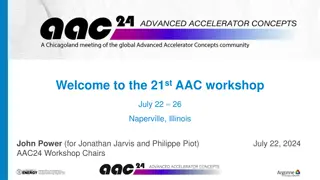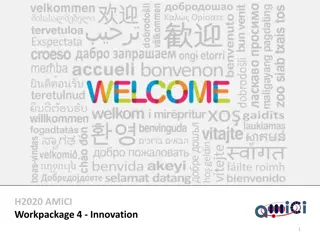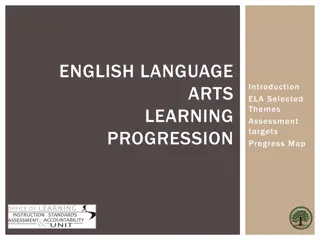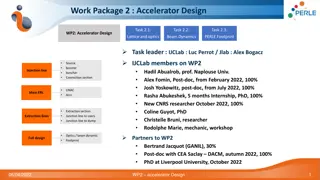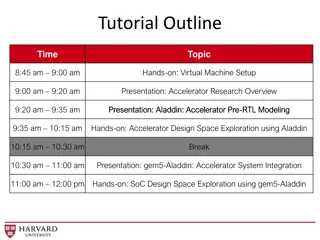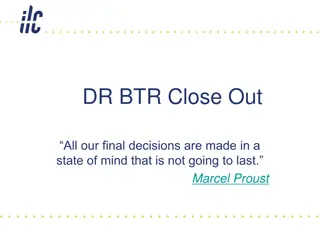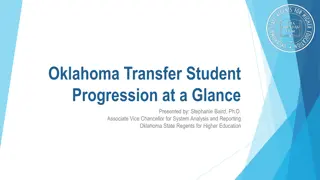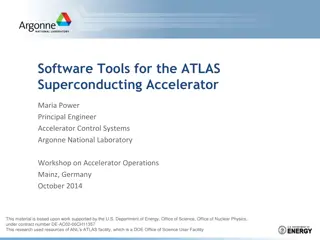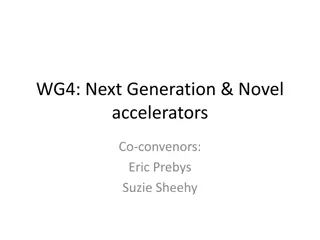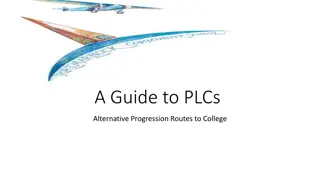The SDG Accelerator Fund
The SDG Accelerator Fund aims to establish a replicable financial facility that links key actors and utilizes blockchain technology to support SMEs in achieving the Sustainable Development Goals. With investments between $100,000 to $2.5 million per venture, the fund promotes cost-effectiveness, tra
1 views • 9 slides
Are we making progress?
The progression of learners in OpenStudio across a qualification through interactions and activities. The project aims to understand how engagement, communication, collaboration, knowledge, and learning skills evolve. The agenda includes discussions on traditional studio progression, factors influen
0 views • 24 slides
Enhancing Curriculum Design for Progression in Learning
This conversation aims to explore effective curriculum design approaches that promote learner progression and success while addressing barriers. Insights shared will influence future projects and initiatives, driving meaningful development towards educational objectives. Key considerations include s
0 views • 11 slides
Understanding Epistemic Progression in Learning: A Humanities Perspective
Exploring the concept of epistemic progression and its importance in education, this content delves into Basil Bernstein's theories on knowledge structure, trends in history education, and the role of procedural knowledge in fostering progression in disciplines like History.
1 views • 10 slides
Current Trends in High Energy Accelerator Developments
Explore the latest trends in high energy accelerator development as discussed by experts from various institutes around the world, including proposals from China and existing accelerator projects. Learn about the classification of accelerator facilities based on size and the ongoing evolution of fut
0 views • 36 slides
European Particle Physics Strategy Update & Accelerator R&D Overview
European Particle Physics Strategy updates serve as the cornerstone for long-term decision-making in the field, with a focus on Accelerator R&D for High Energy Physics. The update process involves key questions, R&D strategies for RF technologies, and implementation plans. Approved strategies emphas
7 views • 25 slides
Exploring Collimators and Bunkers at ESS for Accelerator Radiation Activation
Dive into the study of collimators for a curved beamline, the design of ESS bunkers, and the innovative NMX instrument for biological macromolecule structure determination at the 4th International Workshop on Accelerator Radiation Induced Activation.
2 views • 40 slides
Python Library for Simulated Commissioning of Synchrotrons Accelerator Toolbox Workshop
This workshop presented by Lukas Malina introduces a Python library for simulated commissioning of synchrotrons, focusing on commissioning simulations using AI translation from Matlab. The Python library aims to replicate machines with random errors, provide correction methods, and enhance performan
0 views • 15 slides
Accelerator R&D for High-Energy Physics: Advancements and Future Prospects
Vladimir Shiltsev's presentation at DPF-PHENO 2024 discusses the evolution of accelerator R&D in high-energy physics, emphasizing the need for off-shore Higgs factories and targeted collider developments. The P5 recommendations underscore the importance of engaging in feasibility studies for advance
0 views • 28 slides
Understanding Multiple Sclerosis: Symptoms, Progression, and Treatment Options
Explore the cellular processes, symptoms, disease progression, and treatment options associated with Multiple Sclerosis (MS). Discover how MS, an autoimmune disease, affects the nervous system leading to a range of symptoms. Learn about the clinical progression of MS and how the immune system causes
0 views • 12 slides
Managing Student Progression in Academic Registry
This content provides detailed information on managing student progression in an academic registry, covering topics such as academic framework, boards of examiners, mark finalization, module verification, referral requirements, personal tutorial assessments, student progression criteria, assessment
0 views • 15 slides
Government Contractors Basics for Beginners with OK APEX Accelerator
Explore the essentials of government contracting for beginners, including details about OK APEX Accelerator (formerly PTAC), the services offered, NAICS codes, SAM registration, and more. Learn how APEX Accelerator assists businesses in participating in government contracts, offering counseling, ass
0 views • 20 slides
Accelerator Technology R&D Targets and Sources Overview
The SnowMass2021 Accelerator Frontier AF7 focuses on Accelerator Technology R&D, exploring targets and sources such as high brightness electron sources, muon sources, and high intensity ion sources. The community planning meeting discussed various Letter of Interest submissions outlining innovative
0 views • 7 slides
Accelerator Science and Beam Physics Research Overview at US National Laboratories
US high-energy physics faces budget challenges despite the need for support to remain competitive. John Power from Argonne National Laboratory discusses the importance of funding for core research and accelerator science. The GARD program in the Department of Energy Office of High Energy Physics pro
0 views • 25 slides
Linear Beam Optics and Particle Motion in Accelerator Physics
Explore the fundamental concepts of linear beam optics and particle motion in accelerator physics, covering topics such as design trajectory, path length, phase advance, transfer matrix, and more. Understand the intricacies of designing accelerators and the mathematical representations involved in o
0 views • 78 slides
Safety Assessment and Accelerator Safety Envelope Review
Overview of the Safety Assessment Document (SAD) and Accelerator Safety Envelope (ASE) process for the 400 MeV Test Area (MTA) at Fermilab. The document details the shielding assessment, approval process by various committees, and updates made to the SAD chapters and the Accelerator Safety Envelope.
4 views • 8 slides
Integration of USI and CM at NSLS-II 2019 Accelerator Safety Workshop
This document outlines the Integration of Unreviewed Safety Issues (USI) and Configuration Management (CM) at the NSLS-II 2019 Accelerator Safety Workshop conducted at the ORNL Spallation Neutron Source. It covers the USI process, screening evaluations, training, and qualifications necessary for the
0 views • 13 slides
Principles of Training: Overload, Specificity, and Progression
Principles of training encompass overload, specificity, and progression. Overload requires doing more than usual, specificity involves tailored activities, and progression ensures gradual advancement. These principles are vital for improving fitness levels safely and effectively, emphasizing the nee
8 views • 17 slides
Magnetization, Decay, and Error Fields in HTS Accelerator Magnets
The research conducted at The Ohio State University focuses on understanding the magnetization, decay, and influence of error fields in high-temperature superconducting (HTS) accelerator magnets. The study explores the impact of different superconducting materials such as Nb3Sn, YBCO, and Bi:2212 on
0 views • 21 slides
Future Prospects and Evolving Ideas for the CERN Accelerator School
The CERN Accelerator School is planning upcoming schools and venues, with proposals for its evolution presented. Courses cover various topics across Member States, with a focus on advanced accelerator physics. A future HEP Collider School is also in the pipeline. Suggestions for improvement include
0 views • 16 slides
CO2-Laser-Driven Dielectric Laser Accelerator Proposal
Study and experimental demonstration of a CO2-laser-driven dielectric laser accelerator, addressing the limitations of current accelerator technologies by utilizing longer laser wavelengths for increased charge and improved beam control. The proposal aims to develop a novel in-vacuo scheme for ultra
0 views • 13 slides
Breakdown Test of SW Accelerator Cavity with Shaped Iris
In a study by J.M. Neilson, V. Dolgashev, and S. Tantawi at SLAC National Accelerator Laboratory, planned breakdown tests were conducted on a single-cell SW accelerator cavity with shaped iris geometries. The research assessed breakdown dependence, different iris parameters, and compared elliptical
0 views • 10 slides
Accelerator Progression at STF Facility in 2012
The STF facility witnessed significant advancements in 2012, with activities ranging from vertical cavity testing to fall-run operations and accelerator studies. Key milestones included cool-down processes, beam tuning, collision tuning, and symposium events, leading up to a successful run-end in De
0 views • 8 slides
Future of Accelerator Technologies: Enhancing Colliders and R&D Programs
The Accelerator Frontier Panel discusses the crucial components to enable future accelerators, emphasizing the need for a National Future Collider R&D Program, General Accelerator R&D, and adequate accelerator and test facilities. The message stresses the importance of an integrated future collider
0 views • 17 slides
Recommendations for Advancing Beam Physics and Accelerator Education
The exploration of new physics demands future accelerators beyond 1 TeV lepton colliders and 100 TeV hadron colliders, requiring luminosity in a specific range. Various challenges, including reaching quantum limits, face conventional RF-based beams. The pursuit of disruptive acceleration technologie
0 views • 7 slides
European Plasma Research Accelerator with Excellence in Applications
The European Plasma Research Accelerator project, also known as EuPRAXIA, is a cutting-edge initiative that aims to develop a laser driver for advanced accelerator concepts. Led by a team of experts from various European countries, the project focuses on laser requirements, overall layout, thermal m
0 views • 33 slides
Analog Accelerator: Memristor Basics and ISAAC Accelerator
Explore the world of analog acceleration with topics covering memristor basics and the ISAAC accelerator. From understanding noisy analog phenomena to leveraging wires as ALUs, delve into crossbars for vector-matrix multiplication and the challenges of high ADC/DAC area/energy. Discover solutions li
0 views • 23 slides
Academic Progression Guidelines for Undergraduate Students
Ensure academic progression by achieving a weighted aggregate of 40%+ at each level of study. Requirements differ for Single Honours and Combined Honours students, with conditions related to non-submission, misconduct, grades, and PSRB requirements. Consider options for changing programs if needed.
0 views • 6 slides
Engaging Innovation in Accelerator Technology and Industry Partnerships
This collection of seven white papers explores a variety of topics in the fields of accelerator technology and industry collaborations. Topics range from nurturing the US accelerator technology base to enhancing government support for small businesses in the accelerator community. The papers also de
0 views • 6 slides
Advanced Accelerator Concepts Workshop Highlights and Vision
The 21st AAC workshop held in Naperville, Illinois, showcased research on advanced accelerator physics and engineering. Key themes included developing cost-effective facilities for high-energy physics and photon science, as well as compact facilities for industrial, medical, and security application
0 views • 10 slides
Advancing European Innovation in Accelerator and Magnet Technologies
The AMICI H2020 project aims to enhance collaboration between European companies to drive innovation in mature Accelerator and Magnet technologies. Through round table discussions, the project seeks to identify opportunities for industry engagement, establish collaborative frameworks, and optimize t
0 views • 17 slides
Workshop on Maintaining PIP-II within the Accelerator Complex - Operational Requirements and Interfaces
This workshop, held on July 15, 2021, focuses on maintaining the PIP-II within the Accelerator Complex through discussions on uptime, availability, maintainability, and operability requirements. The event covers various presentations on system interfaces, maintenance strategies, and operational expe
0 views • 4 slides
English Language Learning Progression Assessment and Standards Overview
Explore the English Language Arts (ELA) learning progression, assessment targets, and selected themes. Understand how to read ELA standards, focusing on vocabulary acquisition and interpretation of words and phrases. Dive into grade-specific standards and themes such as reading comprehension and wor
0 views • 11 slides
Accelerator Design and DC Photogun Project Overview
This project overview outlines the tasks and goals related to Accelerator Design and DC Photogun within Work Packages 2 and 3. It includes details on team members, task leaders, activities, equipment, international collaborators, and identified contributors. Key focus areas encompass accelerator des
0 views • 13 slides
Accelerator Design Space Exploration Tutorial
This tutorial covers hands-on activities and presentations on virtual machine setup, accelerator research overview, RTL modeling, design space exploration using Aladdin, gem5-Aladdin for system integration, and SoC design space exploration. Aladdin, a pre-RTL power-performance accelerator simulator,
0 views • 52 slides
Advanced Particle Accelerator Project Updates
Explore the latest updates on the advanced particle accelerator project, including decisions on operating scenarios, lattice parameters, RF considerations, and construction criteria for the accelerator facility. Cost adjustments, upgrade plans, and timelines for key components are discussed, emphasi
0 views • 9 slides
Oklahoma Transfer Student Progression Analysis
Explore the transfer student progression data in Oklahoma presented by Stephanie Baird, Ph.D., analyzing the statewide transfer trends, progression outcomes, and transfer pathways between two-year and four-year institutions. Gain insights into where students are transferring within the state's highe
0 views • 25 slides
Control System Overview for ATLAS Superconducting Accelerator
The ATLAS Control System Group manages control systems from ion sources to specified areas, utilizing hardware such as AlphaServer and various controllers. Software tools from Vista Control Systems offer real-time control functionalities for OpenVMS, Linux, and Windows. Data management includes CAMA
0 views • 17 slides
Innovative Next-Generation Accelerator Technologies Conference
Explore cutting-edge accelerator technologies at the WG4 Next Generation & Novel Accelerators conference, led by Co-convenors Eric Prebys and Suzie Sheehy. Dive into sessions covering advancements in accelerator science, with detailed insights shared in WG Sessions 1 to 5. Uncover the future of acce
0 views • 6 slides
A Guide to Post Leaving Certificate (PLC) Courses and Progression Routes
Post Leaving Certificate (PLC) courses provide specialized, job-focused training with links to industry and progression to universities. Learn why to apply for PLCs, how they act as a stepping stone to higher education, and how to find courses with QQI links for progression. Ensure accuracy by verif
0 views • 11 slides

